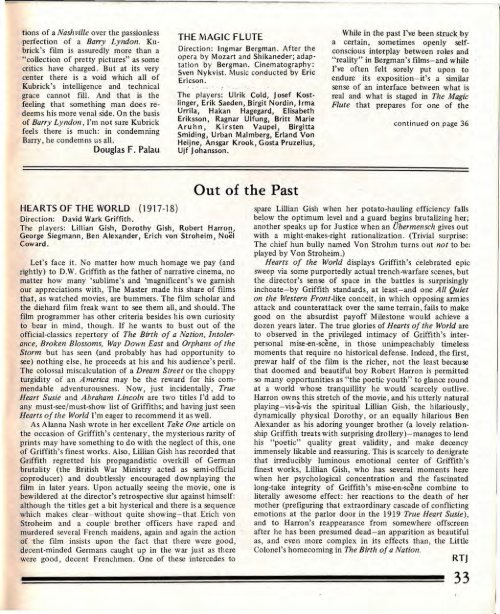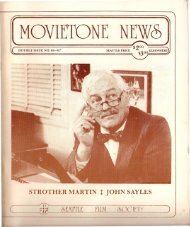MOVIETONE NEW8 . - Parallax View Annex
MOVIETONE NEW8 . - Parallax View Annex
MOVIETONE NEW8 . - Parallax View Annex
You also want an ePaper? Increase the reach of your titles
YUMPU automatically turns print PDFs into web optimized ePapers that Google loves.
tions of a Nashville over the passionless<br />
perfection of a Barry Lyndon. Kubrick's<br />
film is assuredly more than a<br />
"collection of pretty pictures" as some<br />
critics have charged. But at its very<br />
center there is a void which all of<br />
Kubrick's intelligence and technical<br />
grace cannot fill. And that is the<br />
feeling that something man does redeems<br />
his more venal side. On the basis<br />
of Barry Lyndon, I'm not sure Kubrick<br />
feels there is much: in condemning<br />
Barry, he condemns us all.<br />
Douglas F. Palau<br />
THE MAGIC FLUTE<br />
HEARTS OF THE WORLD (1917-18)<br />
Direction: David Wark Griffith.<br />
The players: Lillian Gish, Dorothy 'Gish, Robert Harron,<br />
George Siegmann, Ben Alexander, Erich von Stroheim, Noel<br />
Coward.<br />
Let's face it. No matter how much homage we pay (and<br />
rightly) to D.W. Griffith as the father of narrative cinema, no<br />
matter how many 'sublime's and 'magnificent's we garnish<br />
our appreciations with, The Master made his share of films<br />
that, as watched movies, are bummers. The film scholar and<br />
the diehard film freak want to see them all, and should. The<br />
film programmer has other criteria besides his own curiosity<br />
to bear in mind, though. If he wants to bust out of the<br />
official-classics repertory of The Birth of a Nation, IntoleranCe,<br />
Broken Blossoms, Way Down East and Orphans of the<br />
Storm but has seen (and probably has had opportunity to<br />
see) nothing else, he proceeds at his and his audience's peril.<br />
The colossal miscalculation of a Dream Street or the choppy<br />
turgidity of an America may be the reward for his commendable<br />
adventurousness. Now, just incidentally, True<br />
Heart Susie and Abraham Lincoln are two titles I'd add to<br />
any must-see/must-show list of Griffiths; and having just seen<br />
Hearts of the World I'm eager to recommend it as well.<br />
As Alanna Nash wrote in her excellent Take One article on<br />
the occasion of Griffith's centenary, the mysterious rarity of<br />
prints may have something to do with the neglect of this, one<br />
of Griffith's finest works. Also, Lillian Gish has recorded that<br />
Griffith regretted his propagandistic overkill of German<br />
brutality (the British War Ministry acted as semi-official<br />
coproducer) and doubtlessly encouraged downplaying the<br />
film in later years. Upon actually seeing the movie, one is<br />
bewildered at the director's retrospective slur against himself:<br />
although the titles get a bit hysterical and there is a sequence<br />
which makes clear-without quite showing-that Erich von<br />
Stroheirn and a couple' brother officers have raped and<br />
murdered several French maidens, again and again the action<br />
of the film insists upon the fact that there were good,<br />
decent-minded Germans caught up in the war just as there<br />
were good, decent Frenchmen. One of these intercedes to<br />
Direction: Ingmar Bergman. After the<br />
opera by Mozart and Shikaneder; adaptation<br />
by Bergman. Cinematography:<br />
Sven Nykvist. Music conducted by Eric<br />
Ericson.<br />
The players: Ulrik Cold, ) osef Kostlinger,<br />
Erik Saeden, Birgit Nordin, Irma<br />
Urrila, Hakan Hagegard, Elisabeth<br />
Eriksson, Ragnar Ulfung, Britt Marie<br />
Aruhn, Kirsten Vaupel, Birgitta<br />
Smiding , Urban Malmberg, Erland Van<br />
Heijne, Ansgar Krook, Gosta Pruzelius,<br />
Ujf ) ohansson.<br />
Out of the Past<br />
While in the past I've been struck by<br />
a certain, sometimes openly selfconscious<br />
interplay between roles and<br />
"reality" in Bergman's films-sand while<br />
I've often felt sorely put upon to<br />
endure its exposition-it's a similar<br />
sense of an interface between what is<br />
real and what is staged in The Magic<br />
Flute that prepares for one of the<br />
continued on .page 36<br />
spare Lillian Gish when her potato-hauling efficiency falls<br />
below the optimum level and a guard begins brutalizing her;<br />
another speaks up for Justice when an Ubermenscn gives out<br />
with a might-makes-right rationalization. (Trivial surprise:<br />
The chief hun bully named Von Strohm turns out not to be:<br />
played by Von Stroheim.)<br />
Hearts of the World displays Griffith's celebrated epic<br />
sweep via some purportedly actual trench-warfare scenes, but<br />
the director's sense of space in the battles is surprisingly<br />
inchoate-by Griffith standards, at least-and one All Quiet<br />
on the Western Front-like conceit, in which opposing armies<br />
attack and counterattack over the same terrain, fails to make<br />
good on the absurdist payoff Milestone would achieve a<br />
dozen years later. The true glories of Hearts of the World are<br />
to observed in the privileged intimacy of Griffith's interpersonal<br />
mise-en-scene, in those unimpeachably timeless<br />
moments that require no historical defense. Indeed, the first,<br />
prewar half of the film is the richer, not the least because<br />
that doomed and beautiful boy Robert Harron is permitted<br />
so many opportunities as "the poetic youth" to glance round<br />
at a world whose tranquillity he would scarcely outlive.<br />
Harron owns this stretch of the movie, and his utterly natural<br />
playing-vis-a-vis the spiritual Lillian Gish, the hilariously,<br />
dynamically physical Dorothy, or an equally hilarious Ben<br />
Alexander as his adoring younger brother (a lovely relationship<br />
Griffith treats with surprising drollery)-manages to lend<br />
his "poetic" quality great validity, and make decency<br />
immensely likable and reassuring. This is scarcely to denigrate<br />
that irreducibly luminous emotional center of Griffith's<br />
finest works, Lillian Gish, who has several moments here<br />
when her psychological concentration and the fascinated<br />
long-take integrity of Griffith's mise-en-scene combine to<br />
literally awesome effect: her reactions to the death of her<br />
mother (prefiguring that extraordinary cascade of conflicting<br />
emotions at the parlor door in the 1919 True Heart Susie),<br />
and to Harron's reappearance from somewhere offscreen<br />
after he has been presumed dead-an apparition as beautiful<br />
as, and even more com plex in its effects than, the Little<br />
Colonel's homecoming in The Birth of a Nation.<br />
RTJ<br />
33




